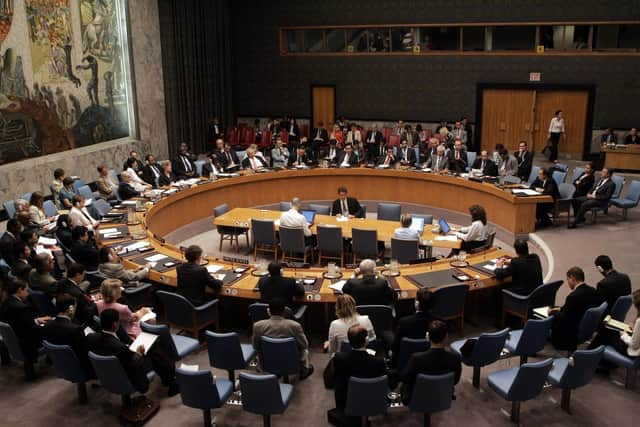Mark Devenport: Leaks are often a sign of political division, but are done for pure motives too


Then to blame each other for breaking confidentiality.
Leaking details of executive discussions is routinely condemned by all sides. However it continues to happen.
Why? Because knowledge is power.


As events unfold, individual politicians and their advisers often see short term advantage in sharing their perspective with a media outlet.
Advertisement
Hide AdAdvertisement
Hide AdThere’s nothing so likely to make a journalist understand your point of view as giving them an exclusive heads up on something newsworthy.
Stormont isn’t the only ‘leaky sieve’ in politics. After details of the proposed lockdown in England were revealed in advance, an enraged Boris Johnson launched a leak inquiry to identify the source — nicknamed the ‘chatty rat’ in Westminster circles.
In Dublin, the Tanaiste Leo Varadkar has been under severe pressure after it was revealed he leaked details of a doctors’ pay settlement to a medical friend.
Earlier this month, as ministers fought the bit out over the future of our own Covid restrictions, SDLP and Ulster Unionist MLAs condemned what one referred to as the “gamesmanship” of those engaged in the leaks.
Advertisement
Hide AdAdvertisement
Hide AdThe Ulster Unionist leader Steve Aiken told the assembly he wanted the leaks to stop because “it seems a bit strange that I find out more from the BBC about what is going on in the executive and what is likely to come out than from ministers.”
The junior minister Gordon Lyons argued that “decisions should be made in the executive and, once made, should in the first instance, where possible, come before the assembly”.
Mr Lyons assured MLAs he wasn’t a leaker, hoping the backbenchers who raised the issue “will also raise it with their executive ministers, so they understand the strength of feeling in this regard”.
The doctrine of perfection, then, is that the executive, after sagely deliberating on the wisest course of action, should adjourn its proceedings so the relevant minister can inform MLAs as they sit on the blue benches. Maybe that’s what happens in the North Korean Supreme People’s Assembly (where I imagine the penalties for any unauthorised disclosure are both immediate and long lasting). But not here.
Advertisement
Hide AdAdvertisement
Hide AdOne obvious problem is that the executive tends to meet on a Thursday and the Stormont chamber doesn’t sit until the following Monday. That means if a decision is of significant public interest — as is the case with anything to do with the Covid crisis — there will be inevitable pressure to inform people in the interim.
One answer was to arrange official news conferences to enable ministers to spread the word as promptly as possible. The Long Gallery pressers were a welcome addition to the executive’s information arsenal, making the Chief Medical Officer and Chief Scientific Adviser (along with their sign language interpreters) much better known in living rooms across Northern Ireland.
However, as we all know, the news conferences were suspended for a long time due to the fall out from the Bobby Storey funeral.
Even when they recommenced, the pressers often overran teatime news outlets, once again creating a need for journalists to fill the vacuum by informing their audiences as much as they could through their own sources.
Advertisement
Hide AdAdvertisement
Hide AdIn September, the First Minister Arlene Foster, defending the DUP against an SDLP charge of spreading “false facts”, bemoaned the tendency of all parties to brief and “put things out on Twitter after executive meetings”. Mrs Foster insisted that “everybody should wise up. We are dealing with huge issues in the executive. People should stop briefing against each other”.
Of course, there are many different motivations for people to leak. As Mrs Foster suggested the classic motive is for one politician to grasp the opportunity to highlight another’s difficulty (indeed at the time she made her ‘wise up’ comment the DUP leader was irked about one of my own reports on her colleague Edwin Poots’ handling of the controversial issue of checks on GB goods at our ports).
However there can be purer motives, as illustrated by the movie ‘Official Secrets’, released last year. It tells the story of a GCHQ translator, Katherine Gun. She leaked details of a plan by the US to bug non aligned members of the United Nations Security Council in order to pressurise them to support the invasion of Iraq in 2003.
When I covered the UN for the BBC, I got information from all manner of people, including an Arab prince who provided a leaked document revealing the acute vulnerability of the peacekeeping force then in place in Sierra Leone. The document’s publication almost certainly accelerated Tony Blair’s decision to intervene militarily in the West African country.
Advertisement
Hide AdAdvertisement
Hide AdIn contrast to the Iraq invasion, the Sierra Leone operation was generally considered a major success as it prevented further heinous human rights abuses by rebel fighters whose stock in trade was hacking off innocent civilians’ limbs.
The Sierra Leone leak had a clear political motive. But during my time at the UN I was also the beneficiary of many leaks from someone at a much less senior level, involved in the distribution of documents around the New York headquarters.
As the recipient of the leaks, I used to be amused by the far fetched theories other journalists came up with for the political motives behind them. I knew it was in fact someone who learned their English as a child by listening to the BBC World Service and reckoned slipping an extra copy of a document under my office door on a regular basis was a polite way to say ‘thank you’.
Back at Stormont, some leaks are motivated by self interest. However others are down to sources sharing the public’s exasperation with the delay and dithering over vital decisions. Yet more are not presented on a silver plate but are the result of assiduous journalists working a range of contacts to turn a hunch into hard fact.
Advertisement
Hide AdAdvertisement
Hide AdNo amount of calls to ‘wise up’ will resolve the leaking symptom, whilst the underlying condition of division and dysfunction goes untreated.
• Mark Devenport is a former BBC Northern Ireland political editor
——— ———
A message from the Editor:
Thank you for reading this story on our website. While I have your attention, I also have an important request to make of you.
With the coronavirus lockdown having a major impact on many of our advertisers — and consequently the revenue we receive — we are more reliant than ever on you taking out a digital subscription.
Advertisement
Hide AdAdvertisement
Hide AdSubscribe to newsletter.co.uk and enjoy unlimited access to the best Northern Ireland and UK news and information online and on our app. With a digital subscription, you can read more than 5 articles, see fewer ads, enjoy faster load times, and get access to exclusive newsletters and content. Visit https://www.newsletter.co.uk/subscriptions now to sign up.
Our journalism costs money and we rely on advertising, print and digital revenues to help to support them. By supporting us, we are able to support you in providing trusted, fact-checked content for this website.
Alistair Bushe
Editor